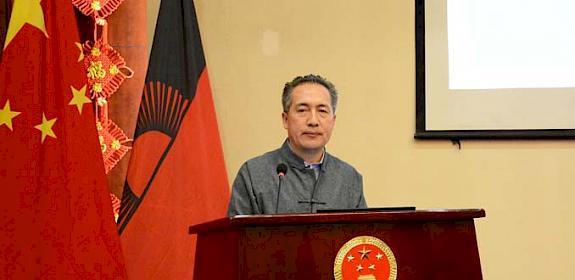Hardwood industry leaders in China sign initiative to curb illegal wildlife trade
Deqing, China, November 2020—Industry leaders representing 13 companies1 from the hardwood timber industry in China signed an “Initiative Against Illegal Wildlife Trade” co-launched by TRAFFIC and China Timber and Wood Products Distribution Association (CTWPDA) during the 10th Global Wood Trade Conference and 2020 China Global Sustainable Hardwood Conference held earlier this month in Deqing, Huzhou, China.
Timber enterprise representatives from 17 countries and regions participated both online and offline during the conferences this year, to discuss the future development of the industry in the wake of the COVID-19 pandemic.
These key meetings are the largest international wood industry exchange platforms in China, and TRAFFIC took the opportunity to draw delegates’ attention to issues around sustainable timber procurement, overseas procurement regulations, corporate social responsibility guidelines, and approaches to counter illegal trade.
TRAFFIC also highlighted tools available to help companies achieve these aims over the next five years, including the new “Initiative against Illegal Wildlife Trade” and the “Corporate Social Responsibility Guidelines.”
“China’s timber industry plays a vital role in related industries in Europe. Accordingly, the supply chain legality, sustainability, and traceability should also be reinforced by Chinese companies, especially those investing in Africa,” said Ms Margaux Verhaeghe, Foreign Policy Instrument, EU Delegation to China, during a video speech.
“TRAFFIC has made many efforts to promote responsible timber procurement and consumption. The EU expects that Chinese companies can co-operate with government departments, industry associations, and NGOs to strengthen supply chain management, improve product traceability, reject illegal wildlife trade, thereby promoting the green development of the Chinese timber industry and making positive contributions to international timber trade.”
Ms Pei Xiaoying, Director of Science & Technology Department, the former General Administration of Quality Supervision, Inspection and Quarantine of P.R. China, said: “High-quality and sustainable development is a path worthy of everyone to explore. Effective exchanges with overseas economies such as the European Union, mutually recognised product sustainability schemes and industry guidelines are important and essential for market expansion, positive competition, and healthy development of the industry. We hope that with our joint efforts, China’s timber enterprises can make even greater contributions to the sustainable development of the timber industry domestically and internationally.”
International expectations regarding product legality, traceability and sustainability in China's timber and wood products industry are high, particularly in light of the dual effects of the pandemic and the Belt and Road Initiative (BRI).
Amir Rashad of Timber Exchange introduced an analysis of prospects for the timber industry in the Middle East and North Africa following the pandemic while Chen Hin Keong, TRAFFIC’s Senior Timber advisor, spoke about the increasing role of Viet Nam as a processor and transit country in timber exports to China and the opportunities for implementation of bilateral and multilateral measures to improve legality and traceability in supplies.
Denis Mahonghol, Director of TRAFFIC’s Central Africa Programme Office, spoke of the impact of timber imports and exports on African countries and local communities and of the rising expectations for the development of greener industries.
During the meetings, the recent amendments to China’s Forest Law were discussed, together with the legal risks and implications for business operations. An in-depth analysis focused on measures to promote legal and high-quality investment and timber trade between China and Africa under the BRI.
Ms Xu Ling, TRAFFIC’s Director in China, spoke of the importance and need to take actions to reduce illegal wildlife trade and improve corporate social responsibility.
“Avoiding illegal trade of wild fauna and flora both protects biodiversity and the long-term development of the enterprise itself," said Ms Xu.
The 10th Global Wood Trade Conference and 2020 China Global Sustainable Hardwood Conference were hosted by CTWPDA and co-organised by TRAFFIC, with support from the European Union, the UK Foreign, Commonwealth and Development Office (FCDO) and the German Government’s Partnership against Poaching and Illegal Wildlife Trade (in Africa and Asia), implemented by GIZ on behalf of the German Federal Ministry for Economic Cooperation and Development (BMZ) and the German Federal Ministry for Environment, Nature Conservation and Nuclear Safety (BMU).
Notes:
1. Industry leaders included representatives from: China Forestry Materials Co., Ltd., BNBMG Forests, Jingjiang Guolin Forest Co., Ltd., Guangxi Guigu Co., Ltd., Zhejiang Shiyou Wood Co., Ltd., Guangxi Forest Industry Group Co., Ltd. Company, Jiusheng Board Co., Ltd., Layo Wood Co., Ltd., Zhejiang Shenghua Yunfeng New Material Co., Ltd., Treezo Group Co., Ltd., Star Forest Star Co., Ltd., Pang’s Group Co., Ltd., Dehua Tubao Group Co., Ltd.




